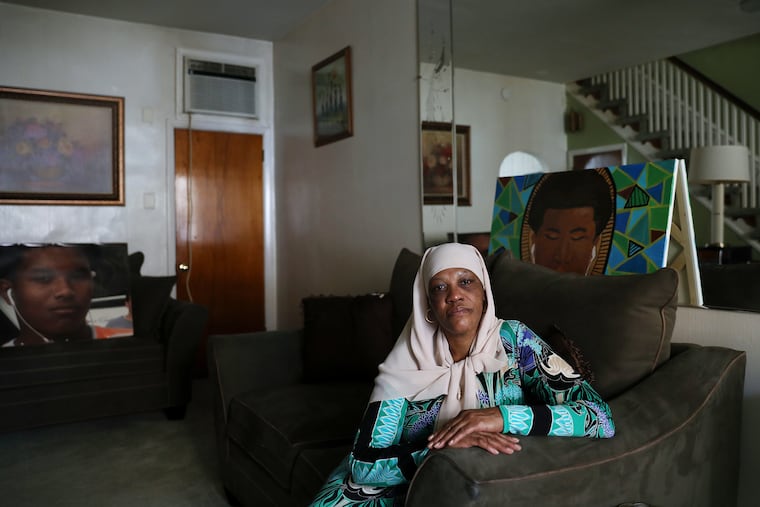Two men were sentenced to 45 years each for killing a 15-year-old at a South Philly gas station in 2018
Hanef Wilkins and Yameen Mofield were convicted of fatally shooting Rasul Benson as part of a long-running conflict among groups from 27th Street, 31st Street, and Wilson Park.

One of Rasul Benson’s grandmothers can’t bring herself to go to the 15-year-old’s grave — she’s still afraid that people connected to his murder may seek revenge against anyone who visits.
Benson’s mother is so racked with grief, she sometimes has nights where she can’t sleep at all, but has other days where the only thing she can do is lie down and close her eyes.
And Benson’s other grandmother, Jackee Nichols, has decided to move out of South Philadelphia, the neighborhood where she’s spent her entire life. The memories of her grandson’s shooting are too painful to bear.
Benson’s death, Nichols said, “killed [our] whole family.”
Benson’s mother, Jasmine Morris, said: “So much of me was lost when my son was taken … I will forever have a hole in my heart.”
Those sentiments were expressed Friday during an emotional sentencing hearing for two men convicted of participating in Benson’s 2018 murder, a fatal shooting at a gas station in which the teen became an unintended target in a long-running neighborhood feud.
Common Pleas Court Judge Charles Ehrlich sentenced both men — Hanef Wilkins, 22, and Yameen Mofield, 21 — to at least 45 years in prison, saying the penalty befit the senseless nature of the crime.
“A promising young man’s life was snuffed out for absolutely no reason,” Ehrlich said.
The proceeding marked the effective end of a yearslong saga that exposed a trail of deeply rooted violence in South Philadelphia — one in which prosecutors say at least 30 people were shot, three fatally, due to a roiling conflict among groups of young men who associated with either 31st Street, 27th Street, or the Wilson Park apartments.
Tensions over the crime remained high Friday. As Ehrlich imposed Mofield’s sentence, he smirked and threw his hands up, causing the judge to admonish him and say: “Rasul Benson never needed to be killed.”
Then, as Mofield was guided out of the courtroom by sheriff’s deputies and toward a holding cell, it sounded as if a scuffle had broken out in an internal hallway beyond the view of the gallery. Some of Mofield’s family members — who had left the courtroom in disgust after hearing the length of his sentence — burst back into the room and began yelling at other sheriff’s deputies.
“Why y’all hitting him?” Mofield’s mother screamed while surrounded by supporters. The fracas cleared up within a few minutes, but more than a dozen deputies then remained stationed in the room as Ehrlich went on to sentence Wilkins.
Before the disruption, Mofield had told Ehrlich he maintained his innocence, but apologized to Benson’s relatives for the pain they expressed during the hearing. He then told his family: “Hard times don’t last forever,” which caused his mother to tear up in the courtroom.
Wilkins, meanwhile, declined to comment. His mother, Syreeta Woods, told Ehrlich that she and Wilkins were also familiar with the toll of gun violence; her nephew, she said, was fatally shot in the summer of 2016.
The killing of Benson has long been shrouded in hostility, perhaps a byproduct of the ongoing nature of the larger dispute between the warring groups.
Authorities have said Benson wasn’t part of the 27th Street crew, but was friends with people who were. The night he was killed, Oct. 4, 2018, Benson was with two friends at the Gulf station on Passyunk Avenue near 25th Street when a car pulled into the station and a gunman got out and chased one of Benson’s friends through the parking lot.
According to surveillance video, which was played at Wilkins’ and Mofield’s trial earlier this year, another shooter fired from the back seat of the car. Benson was struck and later declared dead. His two friends were also wounded.
The case remained unsolved for months, causing Nichols, Benson’s grandmother, to question whether there would ever be an arrest.
But eventually, a man associated with 31st Street, Nyseem Smith, began talking to police about a long string of crimes connected to his group’s feud with 27th Street, including the killing of Benson. Though Smith said he didn’t participate in that shooting, he told police Wilkins and Mofield — also aligned with 31st Street — had come to his house afterward and confessed. And some of the details he provided were ultimately corroborated by other evidence, including cell phone records, according to trial testimony.
Smith also admitted to a host of other crimes connected to the larger feud. During one 13-month stretch, he said while testifying at Wilkins’ and Mofield’s trial, he participated in shootings that left at least 17 people wounded and one man dead — violence he said was motivated by nothing more than his group’s shared dislike of people from 27th Street or Wilson Park.
Assistant District Attorney William Fritze said that nearly 20 people have since been convicted for their roles in that ongoing bloodshed. Wilkins and Mofield were the only ones who took their case before a jury; they were convicted of third-degree murder and related crimes.
On Friday, Benson’s relatives, while speaking to Ehrlich, largely focused on the pain his death has caused. They described him as a loving and respectful teen who liked art, riding his bike, and being a big brother to his siblings.
Afterward, Nichols, one of his grandmothers, wiped tears from her face and said she could finally express some relief.
“It’s over,” she said. “Now we can start to live.”